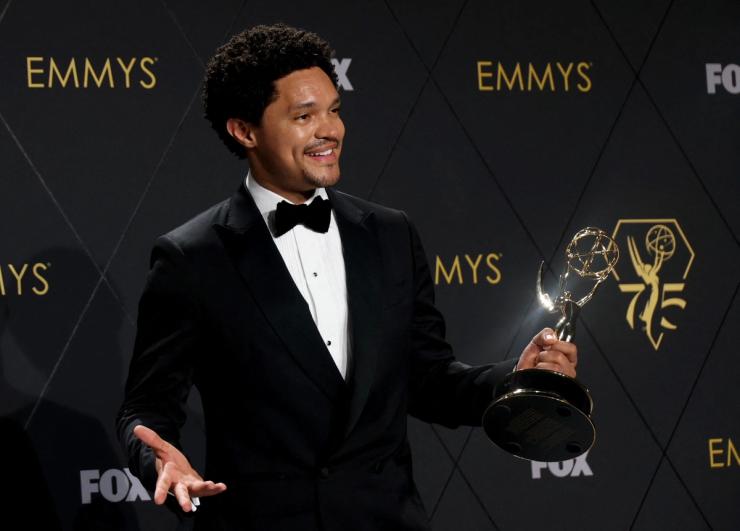The Scoop
Last June, Spotify flew Trevor Noah to the annual advertising festival in Cannes on the French Riviera for a big announcement: The tech company would be the new home for a weekly podcast from the former Daily Show host.
Clad in breezy linens and sunglasses, the comedian sat onstage at Spotify’s massive beach side pop up for an interview with CEO Daniel Ek, who asked him about the possibilities for how brands could interact with his new show. The podcast announcement marked the giant platform’s new bet on the future of audio — away from bespoke, Brooklyn-made narrative podcasts and inexperienced celebrity podcasters and more toward sure thing entertainers with hosting experience.
But just six months later, the relationship has already soured. Noah’s team has discussed re-negotiating or altering his contract with the audio streaming giant, Semafor has learned, which could involve him opting out of his so-called “minimum guarantee,” the amount that he is paid to produce a certain number of podcasts.
At issue is the substantive direction of the show: While the host has wanted to bring on some newsy figures as guests, Spotify executives preferred Noah focus more on big celebrity interviews.
In an interview in November, Noah rejected the idea that his show was going to just be an outlet for celebrities. “No, we’re going to have A-list conversations,” he countered when asked, saying that he was equally as interested in booking scientists and CEOs as celebrities and politicians.
“Hopefully, you can get a deeper understanding of how they see the world,” Noah said of his guests. “And maybe even talk about how they feel about how the world sees them.”
A spokesperson for Spotify pushed back against Semafor’s reporting.
“We are happy with the show and we have no news on any changes to share,” the spokesperson said, but did not comment on creative differences, or whether contract changes are likely.
Representatives for Noah did not respond to requests for comment.
In this article:
Max’s view
The status of Noah’s contract talks aside, the friction between the two marks another headache for the platform’s podcast business. Announced just a day after Spotify decided to part ways with Prince Harry and Megan Markle after their podcast’s lackluster performance, Noah’s deal was supposed to represent the model for the company’s podcast strategy going forward following its disastrous move into celebrity podcasts and expensive narrative podcasts. Noah was not exclusive to Spotify, meaning the company could make more from advertising on his show. And the “always on” nature of the show meant that he would produce shows regularly. Spotify clearly believed it potentially had its own version of SmartLess, or a Joe Rogan Experience for audiences who lean further left. But Noah, as he did when abruptly decided to leave the Daily Show, continues to play by his own rules.
Room for Disagreement
Spotify has made significant cuts to its podcast business, allowing it to be leaner while still retaining popular shows. Its purchase of the Ringer means it owns the Bill Simmons podcast, one of the most listened to shows in America, and the company announced last week that it was resigning host Joe Rogan to a $250 million nonexclusive deal, keeping the biggest podcaster in the business in house. Ek announced on a call with investors last week that the company was on track to meet its profitability target and break even in its podcast business after years of investment.
Notable
Rogan’s new deal with Spotify has resulted in his return to Apple Podcasts after almost a three year absence from the platform. Ek said earlier this week that the previous exclusivity model helped build up Spotify as a podcast streamer, but was unpopular with podcasters. “Exclusivity makes sense when you’re the smaller player trying to gain scale. When you’re the bigger player, the additional value of the exclusivity is far smaller than it is about being aligned.”


